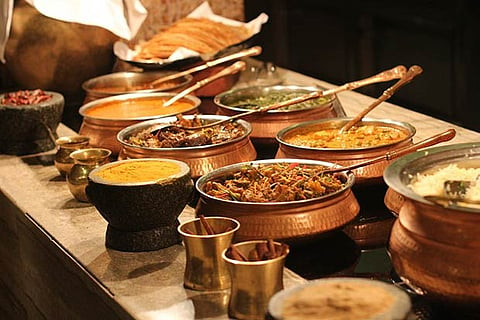

Chennai
However, arriving at a diet plan suited for your body may work in your favour, instead of modifying your existing food pattern. What is more, this plan is sustainable too.
Amritha Mohan, a media professional has a simple diet plan--- a bowl of fruit, upma for breakfast, rice and sambar or dal and rice and a huge portion of vegetables for lunch; an evening snack of almonds or cashews or yogurt; and idli or dosa for dinner. “This is a modified version of my regular diet and the portions here matter the most. I supplement the diet with thirty minutes of workout at least five days a week. I eat smaller meals every two or three hours and that keeps me going. I have been able to maintain my weight for years,” she says.
A great believer in the goodness of native food, Amritha adds that she ensures that rice should be accompanied with dal or vegetables or eaten as khichdi or pongal. Although rice has high glycaemic index, the combination of lentils and veggies reduces the overall GL (or Glycaemic Load) of the meal.
The western influence
Our eating habits and diets are often influenced by the West. However, India has a vast treasure trove of healthy food. These include kaju ( cashews), ambadi (sour greens), aliv (garden cress seeds) and jackfruit. Healthy food is all about eating local and fresh produce. It’s vital to understand that the food we produce is in sync with our climate and ecology,” says celebrity nutritionist, Rujuta Diwekar, who has touched upon the topic in great detail in her latest book Indian Superfoods—Change The Way You Eat.
We are genetically coded to adapt to things that are native, says Dr Krithika Ravindran, Cosmetic Surgeon and Age Management Consultant. “Eskimos need to eat excess fish as it meets the requirements of the cold regions, but we cannot replicate the same here in Chennai. It is seen that Indians who relocate to the US or UK develop health issues, when they take to western eating habits—that explains the link between food and genes,” she says.
She adds that she sees many people switching to olive oil because they feel it is healthy. “But olive oil is not suited for high heat cooking, something Indians do all the time. Instead, we should go for coconut oil or sesame oil,” she points out.
Diets are body specific
With growing number of celebrity examples one has to follow, people take up diet regimens that are not sustainable, points out M Sowmya Binu, Senior Nutritionist. “One can always follow an array of diets—Atkins, Keto, etc., but after a week or a month, these are hard to stick with. The most effective ones are those that help meet your goals and help you stay healthy. Millets are a great source of protein. However, I find people are not keen on it, because it needs a longer cooking time. That is also because it is not processed. Flax seeds are rich in protein. When taken with substantial amount of vegetables every day, your diet will be complete. You don’t have to make a radical shift in eating habits.”
Dr Krithika adds that the native murunga keerai has been proven to be a superfood in the US. “It is rich in iron and is one of the best food items to have on a regular basis,” she says.
It’s easy to stay fit, if you go native, eat wisely and in small portions.
HEALTH TIPS
Visit news.dtnext.in to explore our interactive epaper!
Download the DT Next app for more exciting features!
Click here for iOS
Click here for Android